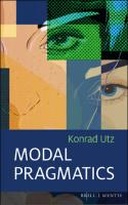Explore

Modal Pragmatics analyzes and systematizes differences among our uses of modal expressions in ordinary language which have not been adequately explained elsewhere. We say such things as: “By necessity, John Tylor was not Jewish; no US-president ever was”; “The rooks cannot move diagonally”; “It is still possible for you to catch the train”; “I am necessarily only in one place at a time”; “Peter will inevitably die; there is no antidote to the venom of the snake that bit him”. These differences are not sufficiently explained by distinctions between different types of modalities like alethic and deontic, or by different bases of evaluation like the speaker’s knowledge or an object’s history. They can, however, be clarified and more systematically defined by establishing a new field of modal differentiation, which we may call “modal pragmatics”. Apart from analyzing ordinary language, this may be helpful in formulating ontological theses.
This book is included in DOAB.
Why read this book? Have your say.
You must be logged in to comment.
Rights Information
Are you the author or publisher of this work? If so, you can claim it as yours by registering as an Unglue.it rights holder.Downloads
This work has been downloaded 12 times via unglue.it ebook links.
- 12 - pdf (CC BY-NC-ND) at OAPEN Library.
Keywords
- conditioned necessity
- Essentialism
- facticity
- Formal necessity
- happenstance
- material necessity
- necessity de re
- ordinary language
- thema EDItEUR::Q Philosophy and Religion::QD Philosophy::QDT Topics in philosophy::QDTJ Philosophy: metaphysics and ontology
- Time
Links
DOI: 10.30965/9783969753316Editions

